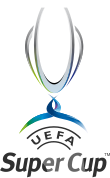Estádio do Dragão
| Estádio do Dragão | |
|---|---|

|
|
| View of the interior of the Estádio do Dragão (2005) | |
| Data | |
| place | Via Futebol Clube do Porto 4350-415 Porto , Portugal |
| Coordinates | 41 ° 9 '42.4 " N , 8 ° 35' 2.5" W |
| classification | 4th |
| owner | FC Porto |
| opening | November 16, 2003 |
| First game | November 16, 2003 FC Porto - FC Barcelona 2: 0 |
| surface | Natural grass |
| costs | 97.8 million euros |
| architect | Manuel Salgado |
| capacity | 50,033 seats |
| playing area | 105 × 68 m |
| Societies) | |
| Events | |
|
|
The Estádio do Dragão ( German Dragon Stadium ) is a football stadium in the Portuguese city of Porto , where the football club FC Porto plays its home games. The stadium, classified by UEFA as stadium category 4 , was the venue for the official opening ceremony during the 2004 European Football Championship . The venue has a capacity of 50,035 spectators, it is all about seats.
Construction of the stadium
Although the city of Porto already had a large stadium with a sufficient number of seats with the Estádio das Antas , it was no longer up to date and was to be replaced by a new arena on the occasion of the 2004 European Football Championship . Work began in the city center as early as 2000 - not far from the Estádio das Antas. The location of the stadium initially caused major problems. Before the first stone could be set, extensive earthworks repeatedly delayed the start of construction.
The new sports facility, designed by the Portuguese star architect Manuel Salgado , was given an unusual design , which ultimately gave the stadium its name. From a bird's eye view , the transparent roof, which was built from 280 tons of steel , is reminiscent of the armor of a dragon . Above the conspicuously arched main grandstands , the roof closes with the top tiers, while on the back door sides, each of which has only one tier, there is a large gap between the top seats and the roof, with a view of Porto's roofs from inside the stadium allowed. The roof construction, which is open to the rear, is at the expense of more seats and does not protect all spectators from rain, but gives the stadium its characteristic appearance.
The construction of the Estádio do Dragão took a little more than three years and cost around 98 million euros, with the state contributing around 18 million euros . It was inaugurated on November 16, 2003 with a friendly match between FC Porto and FC Barcelona (2-0).
Facilities
The Estádio do Dragão is the venue for major events and at the same time a shopping center , as well as a meeting point in Porto's nightlife due to its dining facilities. In addition to the many restaurants and bars , it also offers the possibility of business meetings with its congress rooms. All the facilities, which are all connected to the public areas on the different levels of the stands, contribute significantly to the financing of the stadium.
Since June 5, 2004, the stadium can be reached with lines A, B, C and E of the Porto Metro .
European Football Championship
Just eight months after the inauguration, the Euro 2004 was officially opened in the Estádio do Dragão . The Portuguese national team lost this opening game against eventual winners Greece 2-1. Four more games were played in the stadium during the European Championship:
- June 12, 2004, Group A: Portugal - Greece 1: 2 (0: 1)


- 15 June 2004 Group D: Germany - Netherlands 1: 1 (1: 0)


- 18 June 2004 Group C: Italy - Sweden 1: 1 (1: 0)


- June 27, 2004, quarter-finals: Czech Republic - Denmark 3-0 (0-0)


-
July 1, 2004 semi-finals: Greece - Czech Republic 1: 0 by Silver Goal


Todays use
Since the end of the European Championship, the Estádio do Dragão has mainly been used by its owner, FC Porto , to host its championship and European Cup matches. Since it is one of the three largest stadiums in Portugal, along with the Estádio da Luz and the José Alvalade Stadium , it also hosts international football matches. Occasionally other major events take place, such as concerts by Coldplay (2006) or Muse (2012).
In 2020, the FC Porto stadium will host the UEFA Super Cup match .
gallery
See also
Web links
- Infrastructures ( Memento of November 6, 2013 in the Internet Archive ) (Portuguese, English)
- stadionwelt.de: Stadium guide
- stadiumdb.com: Estádio do Dragão (English)
- groundhopping.de: Visitor report from 2009
Individual evidence
- ↑ fcporto.pt: História (Portuguese)
- ↑ setlist.fm: concert list of the Estádio do Dragão
- ↑ de.uefa.com: Porto will host the UEFA Super Cup in 2020 Article from May 24, 2018





